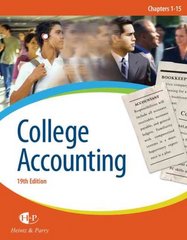Question
Part A: For each event below, identify the type of accounting change and state whether it should be accounted for retrospectively or prospectively.If there is
Part A:
For each event below, identify the type of accounting change and state whether it should be accounted for retrospectively or prospectively.If there is no change state - none.
1.At the end of 2020 a review revealed that the corporation's allowance for doubtful accounts was too large and should be reduced to 2%.When the estimate was calculated in 2019, the allowance
seemed appropriate.
2.Depreciation on a truck, acquired in 2016, was understated because the service life had been overestimated. The understatement had been made in order to show higher netincome in 2017 and
2018.
3.During 2020 a long term bond with a carrying value of $3,700,000 was retired at a loss of $200,000.
Part B:
On January 2, 2018, Begonia Corp. purchased machinery for $ 270,000. The entire cost was incorrectly recorded as an expense. The machinery has a nine-year life and a $ 18,000 residual value. Beaver uses straight-line depreciation for all its plant assets. The error was not discovered until May 1, 2020, and the appropriate corrections were made. Ignore income tax considerations.
- Before the corrections were made, retained earnings was understated by:
- Begonia'sincome statement for the year ended December 31, 2020 would show thecumulative effect of this error in the amount of:
Part C:
On January 1, 2017, Kingslover Ltd. bought machinery for $ 750,000. They used straight-line depreciation for this machinery, over an estimated useful life of ten years, with no residual value. At the beginning of 2020, Detroit decided the estimated useful life of this machinery was only eight years (from the date of acquisition), still with no residual value. For calendar 2020, the depreciation expense for this machinery is:
Part D:
At the beginning of 2017, Thor decided to change from the average cost method of valuing inventories to FIFO, and used FIFO all during 2017 (perpetual system). They have determined that the opening inventory at January 1, 2017, which was $55,500 using average cost, would have been $52,500 using FIFO.This change was made to make their financial statements more reliable and relevant.Thor's tax rate is 35%.
How do I make the journal entry or entries that Thor Corp. would have prepared to adjust for this change during 2017. If you think no entry was prepared, write "none."
Step by Step Solution
There are 3 Steps involved in it
Step: 1

Get Instant Access to Expert-Tailored Solutions
See step-by-step solutions with expert insights and AI powered tools for academic success
Step: 2

Step: 3

Ace Your Homework with AI
Get the answers you need in no time with our AI-driven, step-by-step assistance
Get Started


